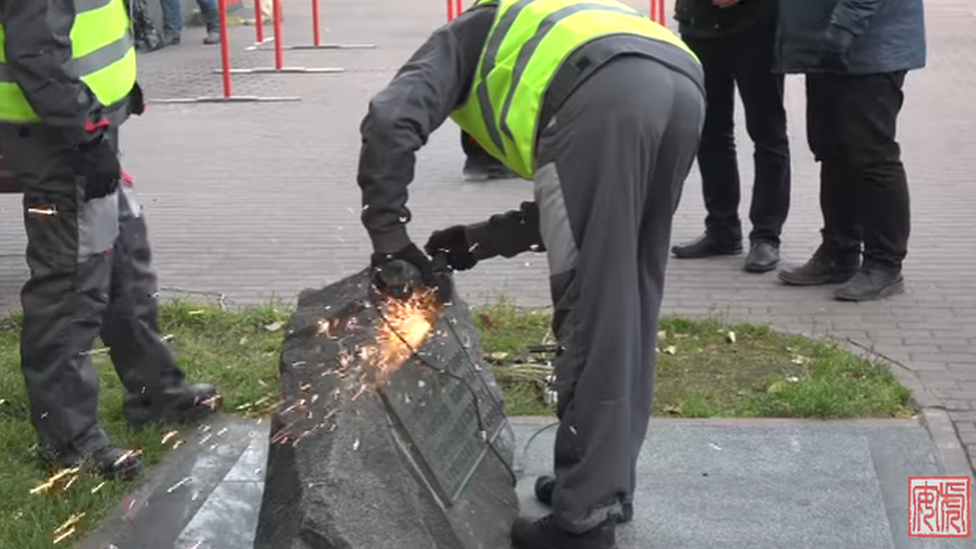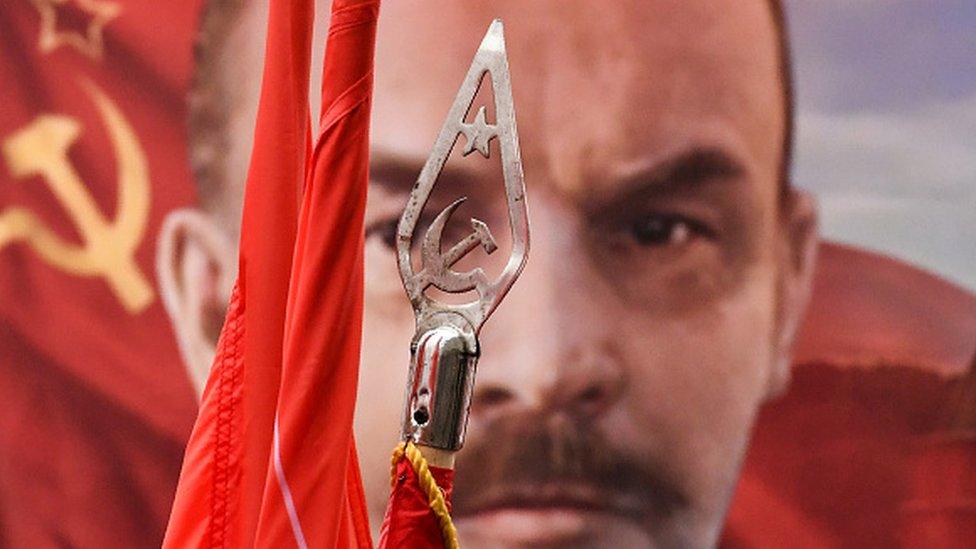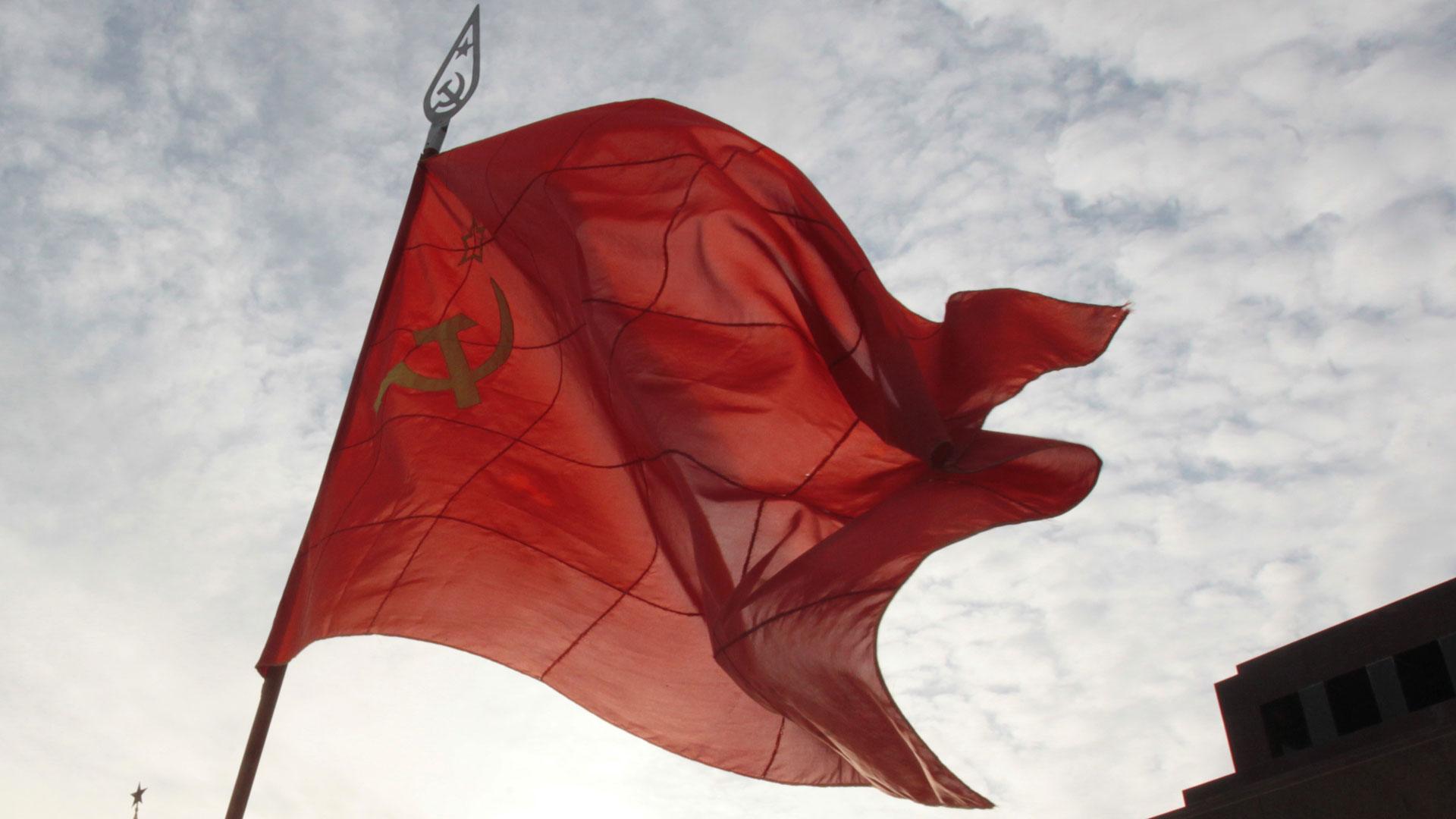Russian Revolution: What young Soviets wanted for today's Russians
- Published

Local people gathered to see one time capsule opened in northern Murmansk
To mark the 100th anniversary of the Russian Revolution, time capsules that were buried 50 years ago across the country are being unearthed.
The 1917 upheaval, including the October Revolution, saw the toppling of the Russian monarchy and the Russian Empire eventually replaced by the Soviet Union.
Young people in 1967 wrote letters to their 2017 peers, celebrating the achievements of Soviet rule and anticipating exciting developments in space exploration and science.
But they could have hardly imagined that - 50 years later - flights to Mars would still be a distant reality, and that the Soviet Union would have collapsed before their messages saw the light of day.

1960s Soviets remembered Yuri Gagarin's space exploration and anticipated exciting space developments
In the Siberian city of Novosibirsk, one capsule contained an enthusiastic letter penned by young Soviets who believed Russians would have dominated space travel by 2017.
"Dear descendants, you're marking an extraordinary day - the centenary of the Soviet rule," it read. "We heartily congratulate you on the great and glorious jubilee. We know that our time is interesting, but yours is even more so.
"We believe that you have equipped our blue planet Earth exceptionally well, have explored the Moon and landed on Mars. You have continued to take over space... and your ships are sweeping the galaxy."
Read more:
Young Soviets in Russia's northern city of Murmansk similarly appeared to be ambitious in their expectations for how Russian space exploration would develop.
"We made the first step in space and you, probably, will be flying to other planets," reads one letter. "You will uncover many new secrets of nature - yet unknown to us - will pacify nuclear energy, bend natural forces to your will, change the climate and plant gardens in the polar region."
'Bright communist future'
In the east Siberian republic of Buryatia, residents were convinced that the Soviet Union would survive to see the centenary of the 1917 revolution.
"We leave you to live in accordance with [Vladimir] Lenin's legacy and implement it together with the older generation. Bear in your hearts a strong Lenin faith in the bright communist future of the people of our planet," one letter read.
Soviet leader Vladimir Lenin speaking in 1917
In the western republic of Adygeya, local Soviet activists expressed hopes that the youth of 2017 would to continue their fight against Western imperialism.
"Our district has turned into an area of progressive socialist economy, developed industry, universal literacy and high culture," the Adygeya news portal, external cites one letter as saying.
"In the next 50 years, we are convinced that progressive mankind [which is the Soviet byword for USSR's allies] will score decisive victories in its fight against the sworn enemy of all peoples - imperialism."
In northern Arkhangelsk, local residents suggested that future generations would come to envy them as the people who built a new Russia.

The anniversary is celebrated on 25 October or 7 November based on two separate calendars
"We know that you will be living better than us, will accomplish feats in the galaxy and will make our earth beautiful. We slightly envy you, who are celebrating the centenary of the Soviet Motherland.
"But we know that you will also envy us, our restless young generation. We have a clear goal, great future and a lot of things to do."
While the Soviets saw the 1917 anniversary as a sacred date, the centenary celebrations have been extremely low-key in Russia and have received minimal coverage in the local press.
The collapse of the Soviet Union in the early 1990s plunged the country into chaos and caused massive inequality between rich and poor.
Since President Vladimir Putin assumed office in 2000, he has described the breakup of the Soviet Union as the "geopolitical catastrophe of the century" and has essentially restored certain aspects of authoritarian rule, including a crackdown on dissent and the establishment of a powerful state media machine.
With specific reference to revolutions, Mr Putin has repeatedly spoken against "colour" uprisings in the post-Soviet states and warned about the consequences of great upheavals.
BBC Monitoring, external reports and analyses news from TV, radio, web and print media around the world. You can follow BBC Monitoring on Twitter, external and Facebook, external.
- Published8 March 2017

- Published7 November 2017

- Published5 November 2017
